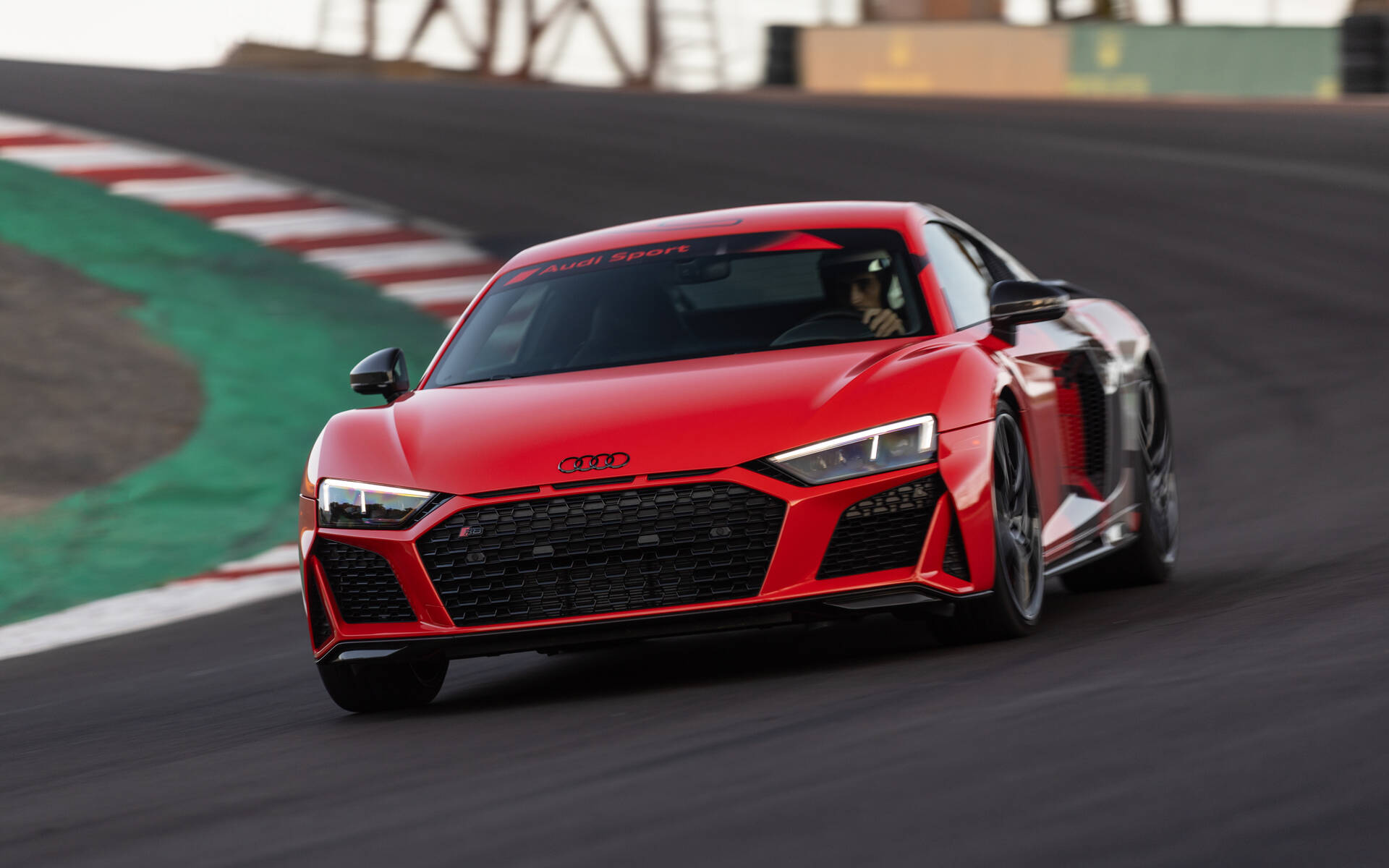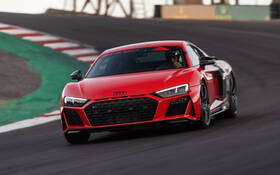2023 Audi R8: Waving the Checkered Flag

| Strong points |
|
|---|---|
| Weak points |
|
Monterey, California—As the naturally aspirated 5.0-litre V10 screams and shoots its way to an 8,700-rpm redline, the 2023 Audi R8 V10 performance I’m driving at Laguna Seca feels like the end of a glorious era. In front of me, nine-time Le Mans winner Tom Kristensen is driving an all-electric Audi RS e-tron GT, which marks the beginning of a new chapter for Audi’s performance division.
The 602-horsepower, ICE-driven sports coupe always manages to shine on this track, and not just because of the setting sun rays bouncing off its sleek German body. Every time I launch it into the famous Corkscrew turn, the R8 amazes me with its sharpness and poise. That’s because the production model shares 50 percent of its components with the R8 GT3 race car, including the engine.
- Also: The Car Guide Podcast: 2023 Toyota GR Corolla and 2023 Audi R8 GT Test Drives
- Also: 2023 Audi R8 GT: Last Blast

The original R8, introduced back in 2008, made history as Audi’s first-ever top-flight sports car. Its unique design with the signature sideblades, naturally aspirated 4.2-litre V8 in a mid-mounted configuration and gated manual gearbox immediately stood out. At Laguna Seca, I even had the privilege of meeting Frank Lamberty, who designed that car.
From Concept to Reality
In 2000, Lamberty worked on a first design study that went on to become Project F03—“F” as in Frankfurt Motor Show and “03” as in 2003, which is the time and place where the preliminary R8 concept was displayed to the public.
“In order to design the R8, I took inspiration from the Porsche 904, the Ducati 996 sportbike and the head of an eagle. Walter Da Silva, who was head of design at Audi back then, wanted a true German mid-engined sports car, not some kind of Italian or British derivative,” Lamberty remembers. “I also looked at famous Auto Union race cars from the 1930s as well as the Audi Avus concept, which is why the R8’s grille is fairly high, with the top connecting the headlights. As a teenager, I was fascinated with the Lamborghini Countach and the fact its engine served as a core element of the design, putting the driver’s cockpit much closer to the front. The separation between the two on the R8 is visually expressed by the Sideblade, which also plays a functional role as a cooling device for the engine.”

Hollywood Glamour
Foreshadowed by the Le Mans Quattro concept, the production R8 actually debuted at the 2006 Paris Motor Show and went on sale as a 2008 model. Exclusively powered by a V8 at first, the coupe was soon joined by a Spyder variant and added a naturally aspirated V10 from the Lamborghini Gallardo after Audi took over the Italian supercar manufacturer.
The striking and high-tech look of the Audi R8 inevitably caught the attention of Hollywood, and the car enjoyed screen time in the Iron Man trilogy (the producer of those movies happened to owned one).

Second Generation
A second-generation R8 arrived for 2017, featuring more aggressive styling and cutting-edge components. This time, only the naturally aspirated 5.0-litre V10 was offered. Over the years, Audi has expanded the lineup with RWD variants, initially limiting production to 999 units of the R8 RWS before turning them into regular models.
Now on the verge of retiring, the R8 lineup consists of coupe and Spyder models with either AWD or RWD. The limited R8 GT (333 units globally) highlights the final year of R8 production.

What’s Next?
Audi is fully committed to electrifying its portfolio, so any successor to the conventionally powered R8 will run on electrons instead of premium gasoline. The Ingolstadt-based company plans to launch 10 new EV models by 2026. We’ll obviously make sure to keep a close eye on them and tell you all you need to know.











